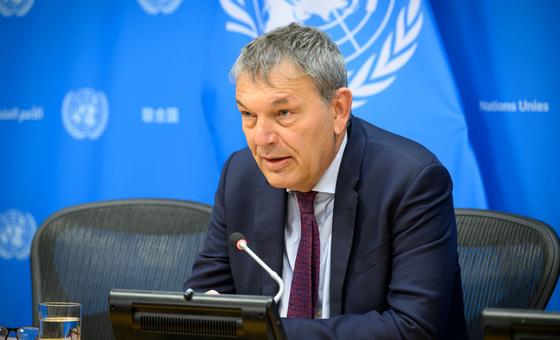Commissioner-General Philippe Lazzarini briefed journalists in New York a day after the independent review panel published its findings.
Former French foreign minister Catherine Colonna spearheaded the report, which found that UNRWA has put in place a large number of mechanisms and procedures to ensure its commitment to the principle of neutrality and outlines some 50 recommendations.
Preparing to update
UNRWA is committed to implement the report’s recommendations, Mr. Lazzarini said, before reporting on his meeting with UN Member States that morning.
“I have informed them that we are now preparing updating our response plan. We will in fact make sure that partners are aware of the measures already being taken and being in line with the recommendations,” he said.
He noted that while some recommendations can be implemented quickly, others will require additional staff and strong commitment and support from the international community.
Mr. Lazzarini also explained that the report is separate from an ongoing probe by the UN’s top investigative body, the Office of Internal Oversight Services (OIOS), into Israeli allegations that 12 UNRWA employees were involved in the 7 October Hamas-led assault on its territory.
UNRWA under attack
The Commissioner-General was in New York for the report’s launch and a Security Council meeting last week focused on UNRWA, which continues to provide support in Gaza amid the ongoing conflict.
He said he told the Council that attacks against the agency “are not necessarily motivated because of neutrality issues, but are primarily motivated by the objective to strip the Palestinians of their refugee status”.
This was why there have been calls for UNRWA not to be present in Gaza, the West Bank and beyond, he added.
He also called for “an independent investigation and accountability for the blatant disregard” of UN premises, staff and operations in Gaza.

UNRWA flag-lowering ceremony at the UNRWA Lebanon Field Office in Beirut.
Staff killed, premises destroyed
To date, 180 UNRWA staff and at least 400 people seeking UN protection have been killed in the hostilities. More than 160 UNRWA premises have been damaged or completely destroyed.
There have also been reports that UNRWA premises that were vacated have been used for military purposes, either by the Israeli army, Hamas or other political factions or armed groups on the ground. Staff have also been arrested and mistreated, if not tortured.
“You have seen the report which came out yesterday,” he told reporters. “So hence, the importance to have an investigation and to have accountability in order not to set a new low standard in future conflict situations.”
Aid on the move
Mr. Lazzarini also highlighted several positive developments. He said the number of aid trucks entering Gaza this month averages around 200 daily, with a peak of 360 on Monday, representing a positive trend when compared to March.
The World Food Programme (WFP) has also entered northern Gaza through the Erez crossing on three occasions.
“My colleagues are also reporting that convoys which went to the north have not been assaulted as they used to be in the past by desperate people who were struggling to get their share of the assistance,” he noted.
Anxiety over impending offensive
However, as warmer weather approaches, he warned about the possibility of new disease outbreaks, especially in the south, where garbage collection is a priority.
“I have also been reminded about the deep anxiety prevailing in the south about the possible looming upcoming military offensive, which seems to be back on the table,” he said, referring to a potential assault on Rafah.
Mr. Lazzarini was asked about funding lost following the allegations against UNRWA, which prompted up to 18 countries to halt their support to the agency.
Several countries “have come back”, he said, expressing hope that more will return in the wake of the Colonna report and the measures that will be put in place. UNRWA has sufficient funding to last until the end of June, he said.
Additionally, since the start of the year, UNRWA has raised $150 million from the general public, which he called “an extraordinary indication of grassroots solidarity vis-à-vis the organization”.

